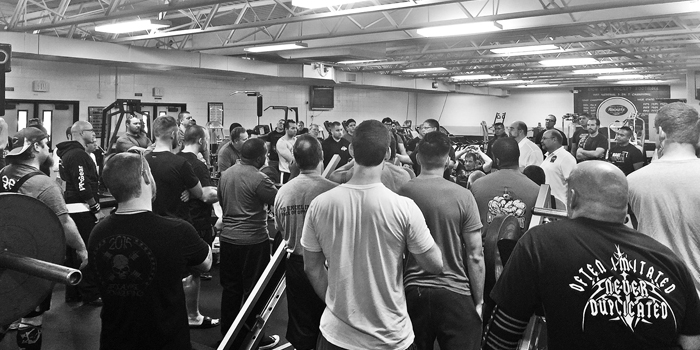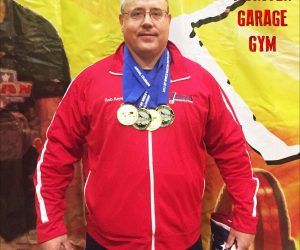
You have put in 2-3 months of training and now it is the time to heal/rest/recover prior to the meet. This is a time when your mind will start to play tricks on you, but you have to mentally commit to the time off for your performance to be the best on the platform.
Training cycles, for those who are serious about their meet prep, are well planned out, copious in nature and a means to an end. The nuances one puts into the training, especially those who have been in the game for a while, are vast and each detail has a purpose, and each purpose of each single detail are all leading toward the goal at the end of the meet prep which is to have the best performance on the platform as possible.
As with most serious competitors the meet prep included attention to technique, attention to the program, attention to the nutritional aspects, attention to rest, consistency, to focus, to the attempt numbers at the meet, to all aspects where we are doing something to move forward. Then there is that time, that time after all of this attention and directly prior to the meet where everything seemly stops. That off time, or deload time, or pre-meet rest time or whatever you wish to call it, that is the time that is unstructured, a time when we do absolutely nothing prior to the meet……or is that really the case?
As doers, as go-getters, as those who are competing not just training, those lifters often feel lost or feel they are getting weaker during that time prior to the meet. That time seems unstructured as so much planning has gone into all of the aspects of meet prep I mentioned, but in reality, that downtime is only unstructured because the lifter has given no structure to it.
That physical downtime can also be structured, but just in a way that looks different from the physically structured portion of the meet prep. The 7-10 days off for the body to heal (in my experience working with literally hundreds of powerlifters over the years, 10 days is more optimal than the 7 days, but that is a story for another time) is a time where the body is resting and recovering but the mind is alive with activity. The best lifters also have a mental program during this physical off time and that is where they focus on things purposely rather than let their mind wander into unwanted territory. Letting the mind wander is like that old saying that idle hands are the devil’s workshop. The idle mind will start to look at the apparent lack of physical activity and it will cause the lifter to feel that because they are not training they are getting weaker and weaker. The reality is, the body is taking part in a physical activity and that is the physical activity of healing and growing stronger. Up to a point, each day prior to the meet when the body is not physically training the skeletal muscles are healing and repairing and growing stronger from the abuse we have thrust onto it during training. Our joints are recovering as are our tendons and ligaments and central nervous system. When we are resting at night after training the body is working feverously to heal, and during this downtime the body can catch up on that healing but also work to refresh the mind and obtain a more systemic healing as well.
The time off is full of activity, it is just a different activity than what we are used to seeing as when we train, we control the activity and when we rest prior to the meet, the activity is biological healing and repairing that we are not so much in control of but that we must be mentally aware of. Realizing that the downtime is serving to help us grow strong(er) is essential because the moment a lifter begins to think they're becoming weaker, the moment these negative thoughts enter the mind is the same moment they start to cause us harm. The mind when unchecked and unstructured will cause worry and introduce stress and cortisol, it will introduce doubt and allow weak-minded thinking to infiltrate and permeate and ultimately begin to erode from the physical work they put in over the weeks and months of meet prep.
Although physiologically incorrect, the saying that the brain is the strongest muscle of them all is psychologically correct. Just as you structure and program your meet prep, structure and program the mental downtime and use that time to visualize your body repairing and getting stronger, visualize the moment after the meet where you raise your arms in victory just like you worked to visualize your successful lifts during your training, use that time to let your confidence grow and keep your mind occupied with the positive. Not sure how to do that, then simply fake it till you make it. Create those thoughts and although that will feel artificial at first, it will become second nature to you just like squatting from a box was once awkward, and now you are technically proficient at it.
Downtime from the gym is only physically downtime as it is now the resting body and the active mind’s turn to contribute to the training. Try not to negate this by wrongly feeling that downtime is weak time...that could not be further from the truth.













I personally recommend a complete deload during that time off. Reason being (and this depends on the gym environment as well as the individual), sometimes we go to the gym just for a little blood flow, and the like, but then we end up spotting our teammates or working the monolift and in my experience, in doing so, we inadvertently "get into" and/or mentally engage into that person's lifts and without even thinking about it we are expending some of our energy as we are mentally focused on and actively encouraging our training partners. Especially with the newer lifters, we remind them that our CNS cannot differentiate between physical stress and mental stress, and the same really goes for sending our energy to our lifting partners. There is a store of energy we use as we yell or shout "UP!!!!," as we are motivating our partners as they drive the weight out of the hole. So, although not physically doing anything in particular, the deload as described in the text is also about the mental deload. So the short answer (too late for that) I personally recommend the complete deload. Wishing you the best in your training. Ever Onward. Eric